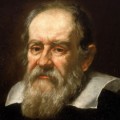Part 2
Blinded, but with his bravery well in tact, Galileo's observations were immediately published under the title "Sidereus Nuncius" in 1610. By supporting the Copernican model of the universe, Galileo placed the Sun at the center of the universe (a heliocentric celestial system) instead of placing Earth at the system's center (a geocentric celestial model) - a model supported by the Roman Church. Galileo knew his postulations were not only threatening to the scientific community, but also the religious community; and, in consequence, threatening to himself. Only one decade earlier, that same religious community answered the heliocentric provocations of astronomer Giordano Bruno with a sentence of death by a burning at the stake.
In 1616, the Copernican model, (now, also, the Galilean model), was banned by the Roman Church. All works by, or references to Nicholas Copernicus were declared heretical.
Although Galileo retained his freedom of movement, his freedom of speech was now abridged. As shyness and blind obedience to authority were not two of Galileo's more prominent traits, Galileo published a further book to further threaten his well-being. Not only did this book support the Copernican model, but also satirically denounced the practices and notions of Aristotelian partisans.
"Dialogue Concerning the Two Chief World Systems," published in 1632, pitted an erudite Copernican against a bull-headed Aristotelian on the nature of the universe and its compositions and relative motions. The year following, Galileo Galilei was place under house arrest and imprisoned there until his death in 1643.
Was this great Italian astronomer truly a heretic? Did he put astronomy above his faith? In short, no.
Galileo wished to publish that which he observed along with some conclusions based on these staggering and historical sights never seen before. Through his telescope, Galileo peered further into God's universe than any other human being had before; he peered towards the heavens and merely recorded what he observed. What was it that he observed? Was this the intricate workings of God or merely a logical system of planets operating with clockwork accuracy; wholly independently and possessing no watchmaker in attendance?
Siderius Nuncius is a book of observations; not one of absolute philosophies. Galileo did not compose heretical postulations, rather, he acted as a stenographer for the Creator of the Heavens.
Through his telescope, Galileo recorded the perfect workings of God's universe and detailed all in his book. Unlike the Holy Bible, where the Word of God is perpetually filtered to the public through men of far less divinity than God, the universe offers a pure, one-on-one dialogue between God and all those who observe it. Here, no allegory or interpretation is necessary. This celestial writ conveys a perfect understanding and a perfect communication from God to man. Consequently, any attack on Galileo's observations - observations so faithfully detailed in Sidereus Nuncius - is, in truth, a direct attack on the Word and Work of God. Even the title of Galileo's most famous book, "Sidereus Nuncius," seems to absolve Galileo from any heretical crime or discredit him from receiving any holy credit for his wondrous observances. The message IS from the stars - NOT from Galileo Galilei.
In a letter to the Grand Duchess Christina di Lorena, Galileo speaks of nature of God and of God's works: "The Holy Scripture AND Nature derive equally from God. The Former: as the dictation of the Holy Spirit, the latter: as the most obedient architect of God's orders. Nature is inexorable and immutable, Nature never violates the terms of the laws imposed upon her, and does not care whether or not her esoteric reasons and ways of operating are disclosed to human understanding." Galileo understood his role as divinely-employed stenographer and not as a translator of God's works. Nevertheless, his, or rather God's ideas, clashed with those accepted by the Holy Roman Church. It was not until 1980-337 years after the death of Galileo-that the Roman church forgave Italy's most eminent scientist. They forgave Galileo for believing what he believed and for uttering heretical propositions after receiving instruction to keep mum on such impious subjects. In response, Galileo was aptly silent; now evidently having learned that quietude is best when placed at odds with the Holy Roman church.

